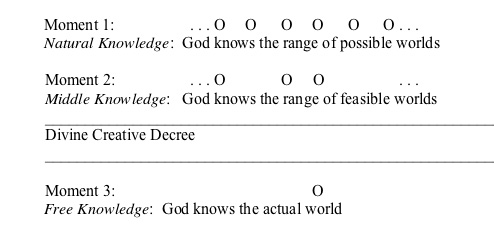Hello loyal readers! We’re going to embark on a different sort of post for awhile (and I’m unpoetic, psh). In this post, I, Excelsior, will be laying the foundations for my view of the relationship between our Will and God, and Athanasius will do his later this week. Athanasius and I think this is very important. In doing so, we will present our assumptions and introduce you to an enormous (both in magnitude and importance) theological conversation. By clarifying our positions in this way, we will be able to write about topics on which we do not completely agree. We have already started a post on sin, for example, and anticipate posts on salvation, atonement, the relationship between time and God, etc.
It is at this point that we wish to stress heavily the unity of the body of Christ. Of course, we have different functions and opinions, but on topics such as this, tensions can flare. We wish to explain our views as lovingly as possible, so that we do not offend anyone nor cause anyone to stumble (Romans 14, 1 Corinthians 8, etc). Our sole purpose to write our differences and expound accordingly is to aid each brother and sister in Christ in his or her understanding of systematic and Biblical theology. By doing so we hope to promote loving conversation, spark interest in theological exploration, and aid each reader in understanding their personal stance for various topics. We could never emphasize enough that all that we write about or all that we do, if without love, is completely worthless (1 Corinthians 13).
Excelsior’s take:
Excelsior’s take:
Taken from 16th century Catholic theologian Luis de Molina, Molinism is in many ways the attempt at cogently unifying God’s Omnipotence with human libertarian free will. The motivation for this philosophical construction was criticism by philosophers that the two views are incompatible, leading to either the view of complete agency (where, presumably, God is not Omnipotent - often called Open Theism) or determinism (where God controls all that happens, apart from (even the existence of) our will - often called Hyper-Calvinism, an admitted misnomer as it is in no way a good reflection of Athanasius’ Reformed Theology).
I wish to start with the Christian’s ultimate axiom - the Bible. Using the Word to show that God is Omnipotent and further that free will is implied, I will follow with the Molinist’s take on their compatibility.
Omnipotence
In a lot of ways, this is simply apparent in scripture. To create the universe, for example, as clarified in Genesis 1, God must be timeless, incredibly powerful, capable of creation ex nihlo (from nothing), timeless, and personal. This is why Anselm deduced God as the “greatest conceivable Being.” Indeed, the Ontological Argument (see Plantinga’s formulation) gives us great reason to think an All-Powerful God is metaphysically necessary.
 But further, scripture speaks more forcefully about God’s control over all that happens. Romans 9:13-16, “As it is written, ‘Jacob I loved, but Esau I hated.’ What shall we say then? Is there injustice on God’s part? By no means! For he says to Moses, ‘I will have mercy on whom I have mercy, and I will have compassion on whom I have compassion.’ So then it depends not on human will or exertion, but on God, who has mercy.”
But further, scripture speaks more forcefully about God’s control over all that happens. Romans 9:13-16, “As it is written, ‘Jacob I loved, but Esau I hated.’ What shall we say then? Is there injustice on God’s part? By no means! For he says to Moses, ‘I will have mercy on whom I have mercy, and I will have compassion on whom I have compassion.’ So then it depends not on human will or exertion, but on God, who has mercy.”This narrative alone, I think, is sufficient to establish God’s Sovereignty over all there is. From this we conclude that He chooses prior to birth who He saves (see Jacob and Esau, Genesis 25:23 for Paul’s reference), that we, as humans, have no power to reach salvation (for we are undeserving of any mercy in the first place - as Paul goes on to explain), and that God is just in doing so. Indeed, throughout the rest of Romans 9, Paul continually appeals to the inability of we as fallen peoples to question God’s Sovereign will, rather than to any free will explanation of culpability. I’m sure Athanasius will expound on this principle greatly, so for now, this I think is sufficient Biblical and philosophical reason to think God is Omnipotent.
Free Will
In D.A. Carson’s book Divine Sovereignty and Human Responsibility: Biblical Perspectives in Tension, he identifies nine separate Biblical concepts that must entail human freedom and literal contingency. Listed, they are (1) People face a multitude of divine exhortations and commands, (2) people are said to obey, believe, and choose God, (3) people sin and rebel against God, (4) people’s sins are judged by God, (5) people are tested by God, (6) people receive divine rewards, (7) the elect are responsible to respond to God’s initiative, (8) prayers are not mere showpieces scripted by God, and (9) God literally pleads with sinners to repent and be saved.
One of my favorite passages in Isaiah is a good example of 1, 2, 3, 7, and 9. “‘Come now, let us reason together, says the Lord: though your sins are like scarlet, they shall be as white as snow; though they are red like crimson, they shall become like wool. If you are willing and obedient, you shall eat the good of the land; but if you refuse and rebel, you shall be eaten by the sword; for the mouth of the Lord has spoken.’” (Isaiah 1:18-20). It seems ridiculous to think that the Lord would reason with puppets. Further, it seems His proposition is one of contingent consequences, one where it is dependent upon the actions of the people of Israel - namely, whether they “refuse and rebel” or are “willing and obedient.”
How Can They Fit Together?
Molinism, as I stated, is a philosophical construction. As such, it is extremely dense. That is why I am more than happy to answer questions or criticisms via email or comment. In order to try to keep this post reasonable, I will explain pretty concisely, and link more thorough explanations of this view. My structure and interpretation is almost entirely dependent on William Lane Craig’s explanations and a close personal friend. Craig’s articles will be cited for your reference.
We start with some axioms:
1. God has knowledge of conditional future contingent events, or Hypothetical Knowledge. In other words, given His Omniscience, He has perfect knowledge. So God infallibly knows the correct result of each counterfactual conditional, or statement constructed “if …., then …..” For example, God would know what would have happened if He has spared the Canaanites. My reading has been limited, but William Lane Craig certifies that this is something “Christian theologians have traditionally affirmed.”
2. God as Natural Knowledge; i.e God knows all the possible worlds, or all necessary truths. Let’s call this knowledge of what could be.

3. God has Free Knowledge; i.e. God knows the actual world. This means that logically prior to God creating the world, God has knowledge of it: past, present, and future. Let’s call this knowledge of what will be.
If God’s Free knowledge was logically prior to His Hypothetical Knowledge, this would entail a world determined and orchestrated exactly as He willed. Thus His knowledge of counterfactual truths is simply the counterfactuals He decreed to be true. There is no counterfactual knowledge prior to His decree. It follows then that there are no conditionals, and thus no free will.
The solution Molinism provides is the logical order in which we find these various types of knowledges. Placing God’s Free Knowledge logically posterior to His Hypothetical knowledge enables God to consider the worlds in which He can create. In this way, Human freedom is preserved, for the conditionals on which human freedom depends is still logically prior to His decree. Thus in this conception, God is able to take His knowledge of all the possible worlds (Natural Knowledge), consider, via his Hypothetical Knowledge, the counterfactual conditionals involved in each possible world, and subsequently decree (Free Knowledge) a world specifically tuned the way he desires, all the while preserving human freedom. 

Craig puts it this way: “Not only does the Molinist view make room for human freedom, but it affords God a means of choosing which world of free creatures to create. For by knowing how people would freely choose in whatever circumstances they might be in, God can, by decreeing to place just those persons in just those circumstances, bring about His ultimate purposes through free creaturely decisions. Thus, by employing His hypothetical knowledge, God can plan a world down to the last detail and yet do so without annihilating human freedom, since what people would freely do under various circumstances is already factored into the equation by God. Since God's hypothetical knowledge lies logically in between His natural knowledge and His free knowledge, Molinists called it God's middle knowledge.”
So in short, God’s Omnipotence is present in the control and forming of the world, literally affirming Romans 9 and verses everywhere. But in an incredible way, we’re still choosing what we do, and responsible for those actions.
Well, that’s it!
Sorry for the long post :D
Excelsior
Further Reading:
- http://www.reasonablefaith.org/divine-sovereignty-and-quantum-indeterminism (my structure)


Totally awesome post.
ReplyDelete